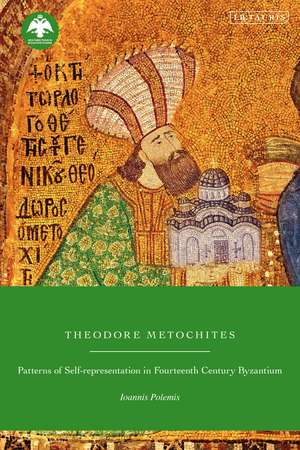Theodore Metochites: Patterns of Self-Representation in Fourteenth-Century Byzantium: New Directions in Byzantine Studies
Autor Ioannis Polemisen Limba Engleză Hardback – 27 dec 2023
Preț: 510.03 lei
Preț vechi: 730.97 lei
-30% Nou
Puncte Express: 765
Preț estimativ în valută:
97.61€ • 101.53$ • 80.58£
97.61€ • 101.53$ • 80.58£
Carte tipărită la comandă
Livrare economică 14-28 aprilie
Preluare comenzi: 021 569.72.76
Specificații
ISBN-13: 9780755651429
ISBN-10: 0755651421
Pagini: 216
Dimensiuni: 156 x 234 mm
Greutate: 0.48 kg
Editura: Bloomsbury Publishing
Colecția I.B.Tauris
Seria New Directions in Byzantine Studies
Locul publicării:London, United Kingdom
ISBN-10: 0755651421
Pagini: 216
Dimensiuni: 156 x 234 mm
Greutate: 0.48 kg
Editura: Bloomsbury Publishing
Colecția I.B.Tauris
Seria New Directions in Byzantine Studies
Locul publicării:London, United Kingdom
Caracteristici
An important contribution to the study of Byzantine literature in general, providing insight into the role and function of texts in Byzantium
Notă biografică
Ioannis Polemis is Professor of Byzantine Literature at Athens University, Greece. He is the author of Theophanes of Nicea: His Life and Works (1996), and numerous editions of the writing of Metochites. His edition of Michael Psellos' funeral orations was published in 2014.
Cuprins
TABLE OF CONTENTSAcknowledgementsINTRODUCTION: LIFE AND WORK AT THE END OF EMPIRE PART I: METOCHITES' REPRESENTATIONS OF HIMSELF AND OTHERS1. Metochites on Himself: Inner Ambiguity 2. Metochites on Others: Mirror Images of Himself 3. Coda-Disposing of Oneself: A New Way of Being? PART II. THE QUEST FOR NOVELTY: INNOVATION VERSUS TRADITION IN METOCHITES' REPRESENTATIONS4. Not Everything Old Is to Be Revered5. Oration 6, for Gregory of Nazianzus: A Response to Men Like Choumnos? 6. Coda-Metochites on Rhetoric: Veiled Criticism of Late Byzantium Discursive Culture PART III: VITA CONTEMPLATIVA VERSUS VITA ACTIVA: AN AMBIGUOUS RELATIONSHIP AND THE INNER AMBIGUITIES OF METOCHITES' SELF-IMAGE AS AN INTELLECTUAL7. 'The Greeks Ask for Wisdom': Quest for a Humanistic Monastery8. Oration 11, Byzantios: The Secular Body of the City and a Secular World Contemplated 9. Coda-Nature and Being: Elusive Concepts Conclusion: Metochites, a Philosopher of His Time Appendix: Works by Theodore MetochitesBibliography
Recenzii
This is the first comprehensive study on Theodore Metochites' self-representation, authored by the world's most experienced scholar with Metochites' work and thought. It plugs an important gap in current scholarship by casting new light on Metochites' multifaceted image of himself and the way it is transformed or adjusted to meet the needs of his audience on different occasions. This study also offers a fresh understanding of the political, intellectual and social climate in Constantinople in the 13th and 14th c., and it is a significant contribution to the field of the reception of the classical tradition in late Byzantium.




